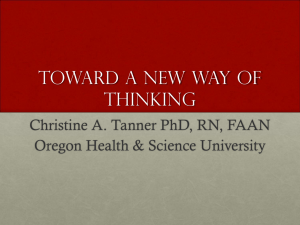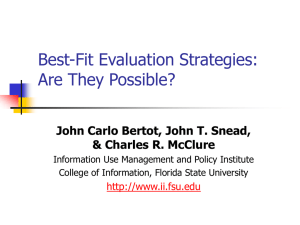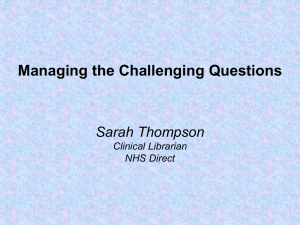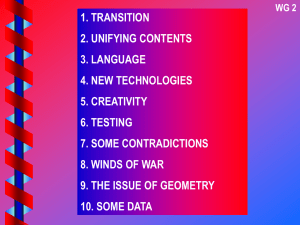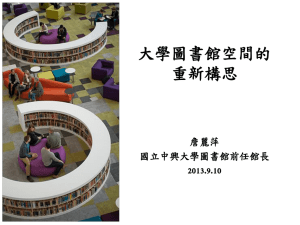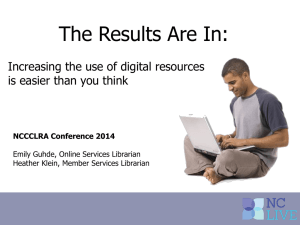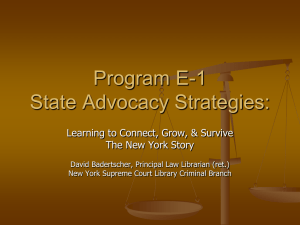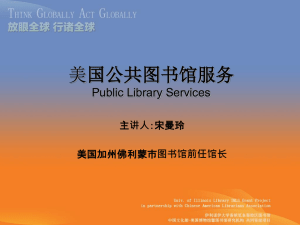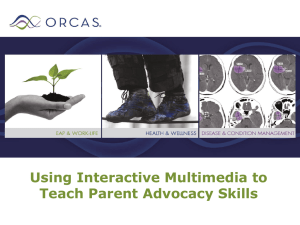Surviving (and Thriving) - ARSL | Association for Rural & Small
advertisement
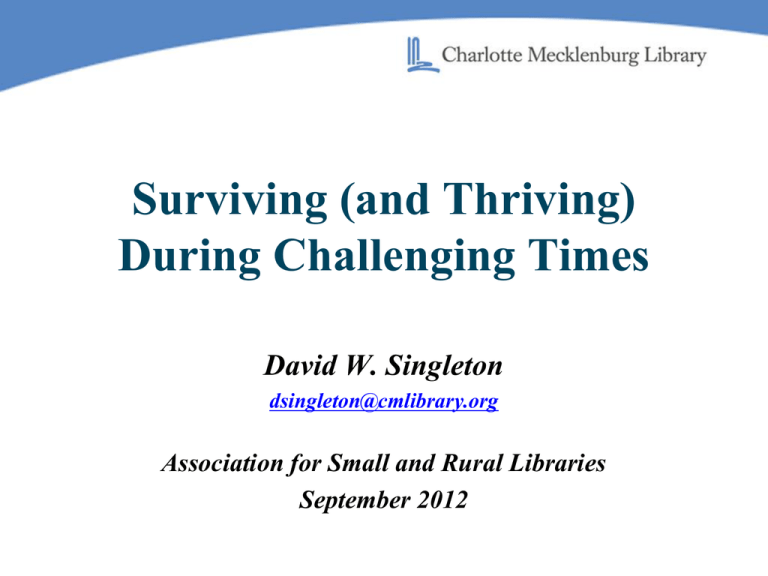
Surviving (and Thriving) During Challenging Times David W. Singleton dsingleton@cmlibrary.org Association for Small and Rural Libraries September 2012 Overview • • • • • • • About Challenging Times Operational Strategies Relationship Building Telling Your Library’s Story Practical Suggestions What Works for Your Library? Q&A In Calm Weather, All Ships Have Good Captains --Swedish proverb, often attributed to Adam Smith About Challenging Times The National Picture • Libraries in the U.S. are coping with the most serious financial crisis in a generation. • Local and state governments, facing drastically reduced revenues, are slicing library funding to unprecedented lows. • Library administrators and trustees are grappling with incredibly difficult decisions to reduce services, programs and staffing. Local Funding Fundraising Public Library Funding State Funding Grants Reframing Challenging Times • We have survived other challenging times • Increased demand shows the value of libraries • Difficult times offer opportunities to reexamine what we do, why we do it, and how we do it • A crisis is a terrible thing to waste Challenging Times≠Normal Times • Environment often unstable or changing quickly • Reduced or stagnant resources, sometimes with increasing demand • People tend to feel less valued and less knowledgeable (what they know isn’t working) • Scrutiny increased; mistakes are often more visible The Stages of Change Active Stage One Stage Two Anger Stage Three Stage Four Testing Balancing Passive Confusion SHOCK Stability DEFENSIVE ACKNOWRETREAT LEDGEMENT ACCEPTANCE Time Stages - CAPS Phases - Italics #1 Tool=Communication • Not a time to hide—Be visible to staff and to the community • Talk face to face whenever possible • Share what you know, even when the news is not great • "Advocating in a Tough Economy" toolkit is available at www.ala.org/tougheconomytoolkit Words that Stop Words that Move • • • • • • • • • • • • • • • • • • I can’t I’ll try Should, have to Someday Yes, but… Problem Difficult Me, My I know or I am right I can I will Will, want to Today Help me understand Opportunity Challenging We, Our I hear you (listen) If you think you are leading and no one is following, you’re just out for a walk. --Afghan proverb Operational Strategies Three Strategies for Operational Success Sharpening focus of services/ programs Building organizational capacity Increasing library revenues Strengthening Focus • Be crystal clear on what you do and why – What are the most critical services? – How can we provide services differently? – What can we stop doing? – What do we need to be doing more of during this challenging time? Programming Focus Areas Workforce Development Educational Success Literacy Building Organizational Capacity • Unified Services – conduct any library service at any service point • WorkSmart - improve workflow for efficiency & effectiveness • Volunteers – updated duties & job descriptions to extend and support the work of staff All Staff Can Assist Customers • • • • • • Apply for a library card Manage library account services/check out Accept payments Recommend a good book Reserve a computer or print Use the library’s website Process Improvement Old New Increasing Revenues • Grants • Community fundraising – Targeted efforts most effective (example: books for young readers) • Friends of the Library (events?) • Fines & fees restructuring Relationship Building Relationship Building • Challenging times are critical times for relationship building with: – – – – Staff Community Partners Funders Staff • Keep them informed of changes (they are the library to the public) • Staff meetings • Weekly email updates/bulletin boards • Involved in decision making as possible Community • • • • Visibility in community Community meetings Civic organizations Churches/faith community Library Managing partner: operations, services, general/ administrative Shared New Library/County Partnership County Funding partner: budget, funding, appointment of trustees Shared activities: Expansion/footprint Capital projects Material changes in service Reporting on performance Significant changes in compensation/benefits Branch closings Telling Your Library’s Story The Power of Data • • • • • Data driven decisions essential Fully costing services Choices/impacts Remove emotions from decision making Moving from outputs to outcomes Dashboard Advocacy Plan • Ties into public funding • Two kinds: – Ongoing – Targeted Ongoing Advocacy Characteristics Strategies are part of communications plan • Informational • Year-round • Showing the value of libraries • Debunking myths: “people don’t need/use libraries anymore” • Awareness campaigns: National Library Week, Teen Tech Week, Teen Read Week, etc. • Stories of impact • Alliances: Friends, County, tourism authority, Chamber Targeted Advocacy Characteristics Strategies are more specific • Geared toward a specific action • Examples: Approve the budget, Give a donation, Pass a piece of legislation, etc. • Has specific start and end date • Has a call to action • Ask person A to contact person B • Ask someone to speak at a meeting • Ask someone to write a letter to the editor • Provide information to those you want to act • Work with allies from ongoing advocacy Key Messages • Master narrative • Support key messages with storytelling to speak to head and heart – Head: Statistics, facts, economic impact – Heart: Stories of impact, how libraries change lives ROI Study: broad benefits • ROI Study conducted by UNC Charlotte Urban Institute • Charlotte Mecklenburg Library returns $4.57 in direct benefits for every $1.00 invested from all sources. Value calculator: personalized benefits Stories of Impact • Four parts:* – – – – Person Problem Library intervention *From Jamie LaRue, Director, Happy ending Douglas County Libraries, speaking at NCPLDA Conference Sample Story of Impact • Person: David • Problem: ASVAB • Library Intervention: Pam, Learning Express • Happy Ending: Got into the field he wanted Stories of Impact • Build into existing communications strategies – – – – – – Advocacy Annual report Newsletter National Library Week Media relations Social media Outcomes Customer with problem or need Library intervention Stories of impact ----------------Outcomes Programming Outcomes • 97% of parents/caregivers attending preschool programs reported they are better prepared to develop pre-reading skills in their children • Pilot program at Long Creek Elementary— measuring impact of summer reading on learning retention/loss Practical Suggestions Collections • • • • • • Adopt a Book Donations Booklists Displays/themes Recover classics/popular titles Did you miss? (Books by bestselling authors) Purchasing • Leasing vs. buying • Consortia discounts • Negotiate discounts & shipping with vendors • Local vendors may provide significant discounts or donate items Communications • • • • • • Board Staff Elected officials Friends Community groups Volunteers Staffing • • • • • New ways to manage services Self-service options for customers Cross-training Staff development May be time to consider shifting roles/ reorganization Volunteers • • • • • • Support and extend the work of staff Staff volunteer point people Job descriptions helpful Checkin/shelving/holds Technology assistance Displays Collaboration • Other agencies • Neighboring libraries • Consortia – ILS – ILL – Shared programming/services What else can you share from your library? Questions? Selected Resources • • • • • American Library Association, “Advocating in a Tough Economy Toolkit,” http://www.ala.org/advocacy/advleg/advocacyuniversity/toolkit Corwin, Scott, Elisabeth Hartley, and Harry Hawkes, “The Library Rebooted,” http://www.strategy-business.com/article/09108?gko=f1e93 Lehman, Jeffrey, “Leadership in Difficult Times,” http://www.jeffreylehman.com/pdf_files_collection/infosys_strap_keynote_-.pdf Mayo, Diane, and Jeanne Goodrich. Staffing for Results. Chicago: American Library Association, 2001. Nelson, Sandra. Strategic Planning for Results. Chicago: American Library Association, 2008. Selected Resources • • • • Noer, David. Healing the Wounds: Overcoming the Trauma of Layoffs and Revitalizing Downsized Orgnanizations (Revised and Updated). New York: Josey-Bass Publishers, 2009. Ruiz, Don Miguel. The Four Agreements: A Practical Guide to Personal Freedom, a Toltec Wisdom Book. New York: Amber-Allen Publishing, 2001. Secretan, Lance H.K. Reclaiming Higher Ground: Creating Organizations that Inspire the Soul. New York: McGraw-Hill, 1997. Salemi, Ray. Leading After a Layoff. New York: McGraw-Hill, 2010.
